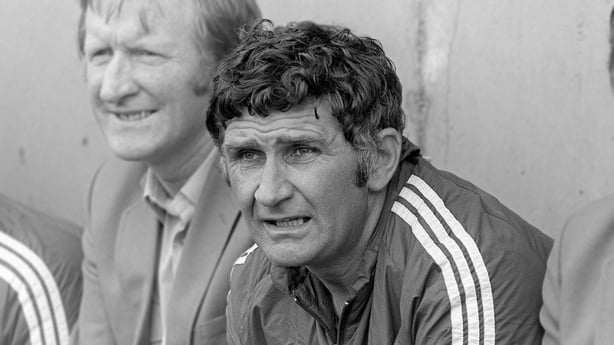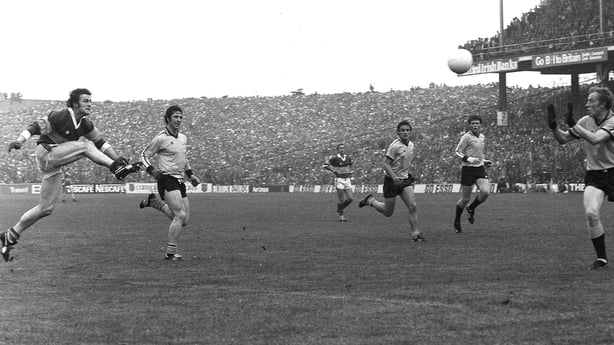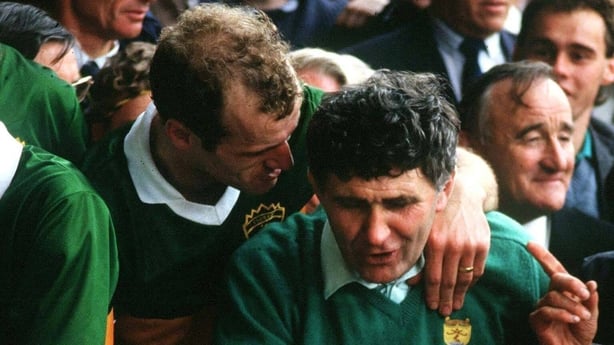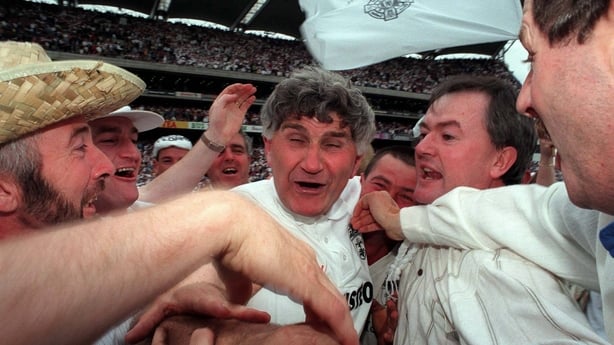Mick O'Dwyer, who has died at the age of 88, stands unquestionably as one of the true giants in the history of Gaelic football.
Across a very long inter-county career as both player and manager, stretching from 1956 until 2013, O'Dwyer won a combined total of 12 senior All-Ireland football titles.
Known by his county men as 'Dwyer' - in his locale in South Kerry it is customary to drop the 'O' - he started making his mark in the Kerry senior team from the second half of the 50s, remaining a central figure, save a couple of years out through injury and retirement, for the next 33 years.
His ancestors on his mother's side were originally islanders, from the now uninhabited Scariff Islands. According to O'Dwyer, his mother's family were the last to leave the island in the early years of the 20th century.
O'Dwyer himself was born and raised in Waterville in South Kerry. As a youngster, he flirted with rally driving and had designs on competing in the Rally of the Lakes in Killarney only for it to coincide with his first ever selection for the Kerry senior team. On his father's advice, he opted to take up the call from Kerry.
A minor in 1954, he was on the substitutes bench as Kerry lost the curtain raiser to Dublin.
He made his senior debut in late 1956, during the early rounds of the 56-57 National League. His first championship appearance would be an inauspicious one, however, Kerry infamously losing to Waterford in the Munster semi-final in June 1957.
It was a rare blip and it wasn't long before the natural order re-asserted itself. A first All-Ireland title arrived for O'Dwyer in 1959, Kerry handily overcoming a Galway team containing Sean Purcell in the decider.
While O'Dwyer would primarily be known as a forward in later years, during the early portion of his Kerry career he was usually picked at wing-back, though he did raid forward to notch a point in the '59 final.

O'Dwyer revealed that the team, and its captain Mick O'Connell, famously left Sam Maguire behind them in the Croke Park dressing-room - a story which has come to symbolise Kerry's routine, expectant and almost casual attitude towards All-Ireland victories.
While O'Dwyer would win three more All-Ireland titles over the course of his playing career, the '60s were, by their lofty standards, an underwhelming and frustrating decade for Kerry football.
An insurgent Down side buried their bid for two-in-a-row in 1960, becoming the first team from north of the border to lift Sam.
Two years later though, O'Dwyer would claim his second All-Ireland title, as Kerry dispatched Roscommon in the decider, the first All-Ireland football final broadcast live on the new Raidío Telifís Eireann.
He subsequently became a selector of the Kerry side in the late 60s and, having recovered sufficiently, one of his first orders of business was to select himself for the team.
However, more heartache was to follow. A once-in-a-lifetime Galway team emerged as Kerry's nemesis, beating them three years running in 1963, 64 and 65, the latter two victories coming in All-Ireland finals.
Labouring under numerous injuries, O'Dwyer called it quits after the '65 All-Ireland final defeat, retiring at the age of 29.
However, he subsequently became a selector of the Kerry side in the late 60s and, having recovered sufficiently, one of his first orders of business was to select himself for the team.
It was a wise selection call. After another final defeat to Down in 1968, Kerry won back-to-back All-Ireland crowns in '69 and '70, O'Dwyer scoring 0-02 and 0-05 in the respective deciders against Offaly and Meath. He was crowned Texaco Footballer of the Year for the 1969 season.
There was time for one more All-Ireland defeat, Kerry unable to stop Offaly's run for two-in-a-row in 1972.
"In that period, we won four All-Ireland finals and we lost five," O'Dwyer recalled in the Micko documentary about his life. "So, they'll tell you that was a bad period for Kerry football."
"I bought 140 lobster pots and I bought a boat. I was going to go fishing. And Gerald McKenna (then county chairman) arrived and asked me to manage the Kerry football team."
His last senior championship game for Kerry was in the Athletic Grounds in Cork in the summer of 1973, when a rampant Cork side, who would go on to win the All-Ireland that September, put five goals past their rivals.
"When I packed up playing with Kerry, I decided fishing was to be my game from there on. I bought 140 lobster pots and I bought a boat. I was going to go fishing.
"And Gerald McKenna (then county chairman) arrived and asked me to manage the Kerry football team. That finished me with my pots and my boats again.
"From there, it was football and the fishing was put aside."
O'Dwyer was Kerry's first proper 'manager', as we might recognise them in a modern sense. Prior to the '70s, inter-county teams were typically picked by large and unwieldy committees. (O'Dwyer, as noted above, had formed part of one while still a player in the late 60s).
In late 1973, Dublin, a long time adrift in the wilderness, appointed 1950s great Kevin Heffernan as head of a new streamlined selection committee, now consisting of just three people. Quickly, 'Heffo' assumed almost complete control of the operation.
In the space of one dramatic year, the Dubs went from also-rans to All-Ireland champions, essentially kick-starting a new era for the sport. The cult of the manager had been born.
Kerry didn't waste time aping this model and O'Dwyer was swiftly appointed as Heffernan's equivalent in the Kingdom. The rivalry between the two teams would dominate the remainder of the decade.
O'Dwyer's appointment coincided with the arrival of a cluster of young players, Pat Spillane, Páidí Ó Sé, Mikey Sheehy, Ógie Moran, John Egan among them.
"I made up my mind that I was going to build a team with youth from the word go," O'Dwyer said. "A team that I would have for at least 10 to 12 years."
He won the first of his All-Ireland titles as a manager in 1975, guiding his young team to a shock defeat of the All-Ireland champions. "It was an ambush, we caught Dublin on the hop that day," O'Dwyer observed later on.

Heffo's Dublin re-asserted themselves over the next couple of years, blasting Kerry out of it in a couple of all-time classics in 1976 and '77.
With the Dubs on the cusp of three-in-a-row, 1978 was regarded as make or break.
"If we were beaten that day, I could quite easily have gone and I might never have been involved with Kerry again," O'Dwyer said later.
By then, Jack O'Shea had already arrived into the team, first appearing in the '77 campaign. Eoin Liston - in Micko's estimation, "the missing link" - was first introduced the following year, slotting in as a distinctive shaggy-bearded target man.
Kerry started gingerly, the Dubs in control, until John Egan plundered a goal and then, famously, Mikey Sheehy in "the greatest freak of all-time" dinked a horrified Paddy Cullen to turn the tide.
In the second half, the Bomber Liston laid waste to the Dublin inside line, slipping home three goals as Dwyer's team ran riot.
The manager later described the 1978 final as the greatest day of his life: "We could say to people: 'Now we've done it'. It was amazing what happened after."
Kerry's golden age had truly arrived. Over the next four seasons, they established a run of dominance in Gaelic football that wouldn't be witnessed again until the Dublin team of the 2010s.
In '79, the Dubs were beaten again, with a minimum of fuss, Roscommon were overcome in a fractious final in 1980, in 1981, the four-in-a-row was sealed as Kerry dispatched Offaly.
We need your consent to load this rte-player contentWe use rte-player to manage extra content that can set cookies on your device and collect data about your activity. Please review their details and accept them to load the content.Manage Preferences
The core group of players, which largely remained the same, became household names in Irish life.
Legendary world tours/drinking tours were embarked upon, novel and contentious sponsorship deals were entered into with Adidas and Bendix (the latter being washing machine manufacturers) - taboo within the GAA at the time.
By '81, they had equalled the record of the previous four-in-a-row Kerry team of 1929-32.
"Every time we played a game, we were nearly guaranteed to win," said O'Dwyer. "At one stage, I never even thought about it. It was just another All-Ireland coming and I wasn't even counting."
The supporters were counting. Kerry's perceived invincibility was such that their fans were happy to dispense with their much-trumpeted caginess.
"Five in a row, five in a row, it's hard to believe we've won five in a row," went the lyrics of the infamous Galleon song in 1982. Tralee and Killarney bickered over who was to host the homecoming party.
The five-in-a-row looked secure until the closing minutes when Liam Connor hoisted a "high, lobbing, dropping" ball into the full-forward line, substitute Seamus Darby subtly nudged Tommy Doyle with his rear, wheeled and lamped it high into the far corner above the despairing Charlie Nelligan.
The five-in-a-row dream was denied at the death in agonising fashion, in what remains arguably the most famous Gaelic football match in history. It was to be another 37 years before Dublin became the first team to win five.
O'Dwyer was hailed for his graciousness after the loss but he was genuinely devastated.
"We were so close, I felt sick," said O'Dwyer. "I think of it (the '82 game) at least once a week. It's implanted in my mind."
Notwithstanding this let down, Kerry soon returned to the summit, winning three more titles in a row in business-like fashion between 1984 and 1986.

In their last All-Ireland victory in '86 - the team now with an average age close to 30 - Kerry overhauled a seven-point half-time deficit to edge out Tyrone, then a Cinderella outfit. The team still contained ten of the starters who had begun the 1978 final eight years earlier.
Their aging team ran out of steam the following year, Cork grabbing the baton in Munster and keeping their rivals down for most of the next decade. Kerry wouldn't win another All-Ireland title for 11 years, their longest famine following hot on the heels of their greatest bonanza.
By then, Micko, as he was now universally known, had embarked on a different chapter. Finally departing Kerry after the 1989 Munster final defeat, he stunned the football world by taking over as Kildare manager in the latter part of 1990.
Long miserable under-achievers in Leinster, Kildare embarked on an epic quest for championship silverware in the 90s, propelled in large part by Micko's charisma and the buzz engendered by his arrival.
It remained elusive in his first four-year stint, which produced a league final defeat in '91 and Leinster final losses in '92 and '93, all to Dublin.
After a two-year "sabbatical", as he called it, O'Dwyer returned for another tilt in late '96. His son Karl, frozen out of the Kerry set-up after the 1993 Munster championship loss to Cork, was now part of the quest, transferring to Kildare as an efficient inside-forward.
After a dramatic three-game saga against Meath in '97 - the stubborn pantomime villains of the era - Kildare returned for the year of years in '98.
After accounting for Laois, they banished their demons one by one, defeating Dublin and then Meath to win a famous Leinster crown, their first for 42 years.

In the semi-final, Dwyer was pitched, inevitably, into a battle with his own county, now managed by his former captain Páidí Ó Sé. Micko got the better of the contest by a solitary point and Kildare had beaten the last three All-Ireland champions en route to the All-Ireland final.
The buzz had now reached fever pitch, the then Minister for Finance Charlie McCreevy, a Kildare football fanatic, labelling the semi-final experience as "better than sex" in a television interview.
However, O'Dwyer's hopes of becoming the first, and still only, man to manage two different counties to All-Ireland glory were ended by his old bogey team Galway in the decider.
Micko wasn't through with Kildare, adding a second Leinster title in three years in 2000, following an inspired second-half comeback against Dublin, though the Tribesmen accounted for them again in the All-Ireland semi-finals.
The pair of provincial triumphs remain Kildare's only two Leinster championship victories in the past 65 years.
After Kildare, O'Dwyer continued as a kind of managerial missionary/troubleshooter within Leinster, touring the province instructing the locals in the ways of winning football.
He guided Laois to a memorable provincial title in 2003, and generated a rare buzz within Wicklow, whom he guided to the last 12 in 2009.
His final managerial job was with Clare in 2013.
A living legend long before he ever departed the game, his exploits, in particular as a manager, subject to endless documentaries, books and folklore tales.
In the summer of 2012, a statue of O'Dwyer was unveiled in his native Waterville.
We need your consent to load this rte-player contentWe use rte-player to manage extra content that can set cookies on your device and collect data about your activity. Please review their details and accept them to load the content.Manage Preferences
Off the pitch, O'Dwyer had a varied career, working as a hotelier, an undertaker and, in his younger days, as a mechanic.
However, it is Gaelic football with which his name will always be associated, and he stands as possibly the game's greatest ever figure.
"I'm addicted totally to the game, sure aren't I stuck on the thing for the last 70 odd years," he told RTÉ in 2018. "I'll keep at it now until I go into the grave.
"I've no more to do. I did it all. And I got great enjoyment out of it and I wouldn't change it for the world."
